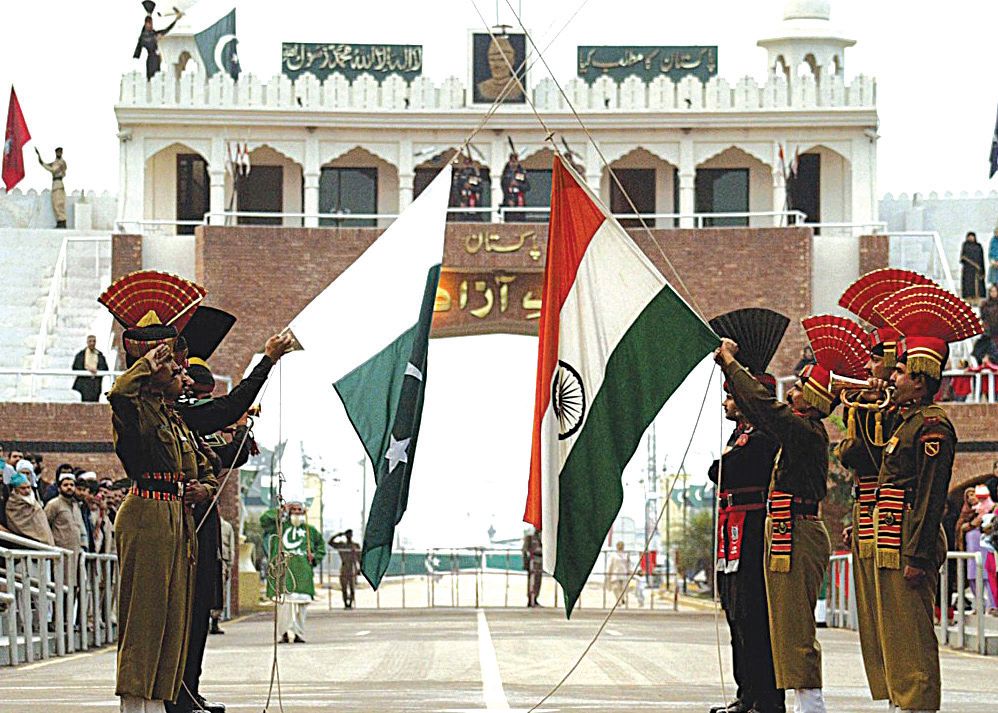Taliban Brings Terror To Lahore
India and Pakistan have suspended the flag lowering ceremony at the Wagah Border as a gesture of

NEW DELHI: At least 60 people were killed and over 200 injured when a suicide attacker detonated a bomb at the Wagah crossing on the India-Pakistan border on Sunday evening.
The attack makes good the threat issued by the Taliban to Prime Minister Nawaz Sharif that unless the military operations against the militants were stopped, they would destroy Lahore. This is a major offensive by the militants just on the outskirts of Lahore, that heralds a change in Taliban strategy.
“The bombing took place at 5.50pm as attendees of the flag-lowering ceremony started leaving the parade ground,” Major General Tahir Javed Khan, the director general of Pakistan Rangers Punjab was quoted confirming the incident by Pakistani media.
(This image, by Express Tribune, shows where the bomb exploded. Because of security barricades put up two weeks ago, it was detonated about 500 meters away from the parade ground. Maj Gen Khan of the Pakistan Rangers said that if the bomb had exploded closer or at the parade ground, the casualties would be even higher).
The Tehreek-i-Taliban Pakistan (TTP) claimed responsibility for the attack. The TTP spokesperson Ahmed Marwat said that the attack was in response to Operation Zarb-e-Azb -- which is being carried out in North Waziristan targeting militants in the region and was in itself a response to the Karachi airport attack carried out by the Pakistani Taliban. The Wagah attack is the largest attack in terms of scale and casualties since the military operation against the militants began in June.
However, other groups including Jundullah and Jamat-ul-Ahrar -- which broke from the TTP leadership months ago -- have come forward and laid claim. Outlining the same rationale for the attack, Jamat-ul-Ahrah spokesperson Ehsanullah Ehsan was quoted by Pakistani media saying "this attack is revenge for the killing of innocent people in North Waziristan,” and adding, “some other groups have claimed responsibility of this attack, but these claims are baseless. We will soon release the video of this attack.” Jamat-ul-Ahrar, which has claimed responsibility for several attacks including, most recently, the October 23 attack on Maulana Fazlur Rehman in Quetta, were behind a September 2013 twin suicide blast that killed 127 people at a Peshawar church and a June 2013 attack that had killed several foreign tourists attempting to climb Nanga Parbat, amongst other incidents.
At the time of writing, a search operation conducted near the blast area led to the recovery of explosives and suicide vests.
Meanwhile, India and Pakistan agreed to suspend the daily flag lowering ceremony as a gesture to mourn the victims of Sunday’s attack. “It is the first time we have suspended the ceremony after the war. The ceremony was not suspended even during Kargil,” India's home ministry spokesperson K.S. Dhatwalia said.
Earlier, Indian Prime Minister Narendra Modi condemned the attack as a "dastardly act of terrorism".
The attack itself comes at a time when India and Pakistan are engaged in cross border hostilities along the line of control, leading to twenty deaths in the past month as both sides resort to what the other describes as “unprovoked firing.”
The Indian side of the Wagah border was unaffected by the blast, with media quoting Ashok Kumar, the inspector general of India’s Border Security Force saying, “our side is safe. We are alert, have increased our security, we are in constant touch with district officials and state police.”
Although Sunday’s attack seems to have been targeted at the Pakistani military and civilians who are perceived to be supportive of the country’s security establishment, there has been an attempt in the past to attack soldiers of both countries at the border crossing. On December 31, 2009, two men suspected of attempting to attack the Wagah border, with the specific aim to lead to casualties on the Indian side, were arrested by Pakistani officials.
Whether Sunday’s attack was in response to Zarb-e-Azb or not, the incident itself underlines the need for India and Pakistan to cooperate to combat terrorism in the region.



